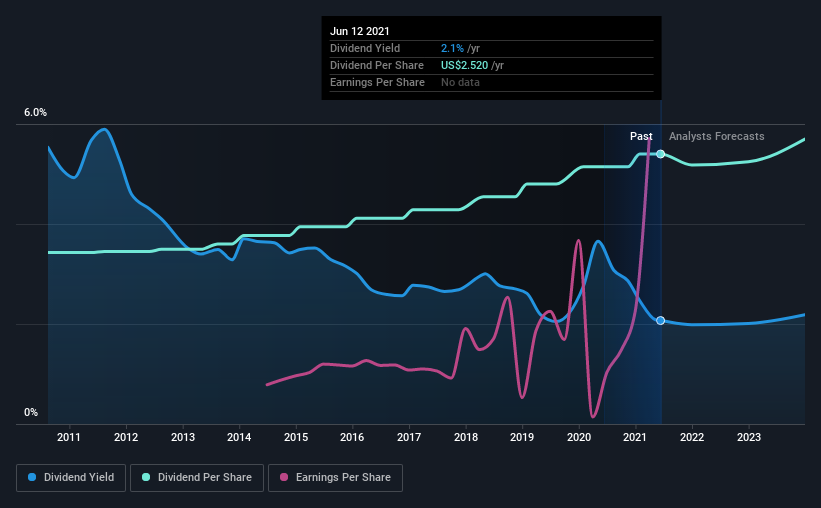Is It Smart To Buy Cincinnati Financial Corporation (NASDAQ:CINF) Before It Goes Ex-Dividend?
Readers hoping to buy Cincinnati Financial Corporation (NASDAQ:CINF) for its dividend will need to make their move shortly, as the stock is about to trade ex-dividend. The ex-dividend date occurs one day before the record date which is the day on which shareholders need to be on the company's books in order to receive a dividend. The ex-dividend date is an important date to be aware of as any purchase of the stock made on or after this date might mean a late settlement that doesn't show on the record date. Accordingly, Cincinnati Financial investors that purchase the stock on or after the 16th of June will not receive the dividend, which will be paid on the 15th of July.
The company's upcoming dividend is US$0.63 a share, following on from the last 12 months, when the company distributed a total of US$2.52 per share to shareholders. Calculating the last year's worth of payments shows that Cincinnati Financial has a trailing yield of 2.1% on the current share price of $121.8. Dividends are an important source of income to many shareholders, but the health of the business is crucial to maintaining those dividends. That's why we should always check whether the dividend payments appear sustainable, and if the company is growing.
Check out our latest analysis for Cincinnati Financial
If a company pays out more in dividends than it earned, then the dividend might become unsustainable - hardly an ideal situation. Cincinnati Financial has a low and conservative payout ratio of just 13% of its income after tax.
Companies that pay out less in dividends than they earn in profits generally have more sustainable dividends. The lower the payout ratio, the more wiggle room the business has before it could be forced to cut the dividend.
Click here to see the company's payout ratio, plus analyst estimates of its future dividends.
Have Earnings And Dividends Been Growing?
Stocks in companies that generate sustainable earnings growth often make the best dividend prospects, as it is easier to lift the dividend when earnings are rising. If earnings fall far enough, the company could be forced to cut its dividend. That's why it's comforting to see Cincinnati Financial's earnings have been skyrocketing, up 38% per annum for the past five years.
Another key way to measure a company's dividend prospects is by measuring its historical rate of dividend growth. Cincinnati Financial has delivered an average of 4.6% per year annual increase in its dividend, based on the past 10 years of dividend payments. Earnings per share have been growing much quicker than dividends, potentially because Cincinnati Financial is keeping back more of its profits to grow the business.
The Bottom Line
Should investors buy Cincinnati Financial for the upcoming dividend? Typically, companies that are growing rapidly and paying out a low fraction of earnings are keeping the profits for reinvestment in the business. Perhaps even more importantly - this can sometimes signal management is focused on the long term future of the business. Overall, Cincinnati Financial looks like a promising dividend stock in this analysis, and we think it would be worth investigating further.
With that in mind, a critical part of thorough stock research is being aware of any risks that stock currently faces. Every company has risks, and we've spotted 1 warning sign for Cincinnati Financial you should know about.
We wouldn't recommend just buying the first dividend stock you see, though. Here's a list of interesting dividend stocks with a greater than 2% yield and an upcoming dividend.
This article by Simply Wall St is general in nature. It does not constitute a recommendation to buy or sell any stock, and does not take account of your objectives, or your financial situation. We aim to bring you long-term focused analysis driven by fundamental data. Note that our analysis may not factor in the latest price-sensitive company announcements or qualitative material. Simply Wall St has no position in any stocks mentioned.
Have feedback on this article? Concerned about the content? Get in touch with us directly. Alternatively, email editorial-team (at) simplywallst.com.

